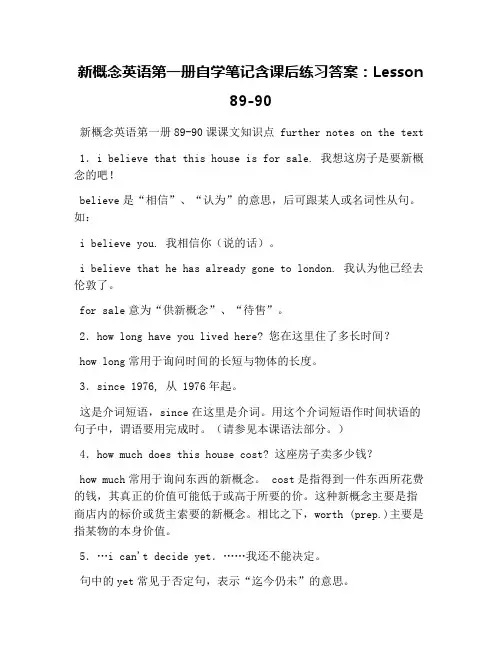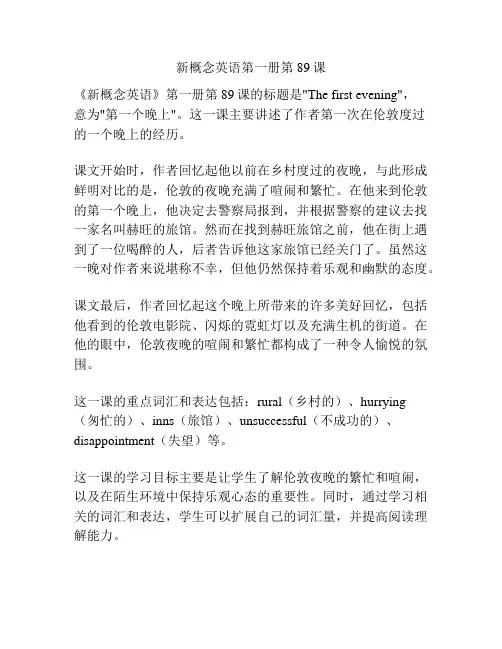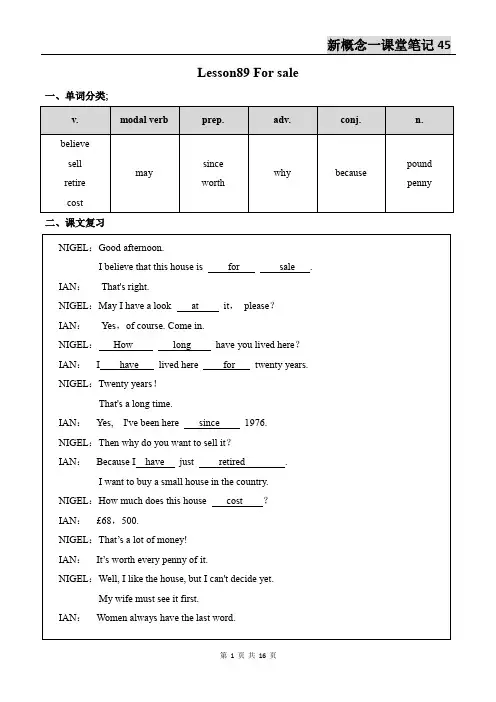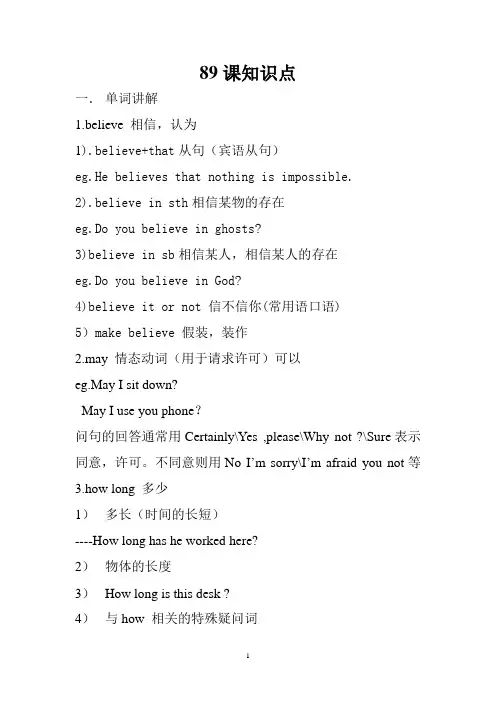(完整word版)新概念第一册89课知识点.docx
- 格式:docx
- 大小:16.45 KB
- 文档页数:6



新概念英语第一册自学笔记含课后练习答案:Lesson89-90新概念英语第一册89-90课课文知识点 further notes on the text1.i believe that this house is for sale. 我想这房子是要新概念的吧!believe是“相信”、“认为”的意思,后可跟某人或名词性从句。
如:i believe you. 我相信你(说的话)。
i believe that he has already gone to london. 我认为他已经去伦敦了。
for sale意为“供新概念”、“待售”。
2.how long have you lived here? 您在这里住了多长时间?how long常用于询问时间的长短与物体的长度。
3.since 1976, 从 1976年起。
这是介词短语,since在这里是介词。
用这个介词短语作时间状语的句子中,谓语要用完成时。
(请参见本课语法部分。
)4.how much does this house cost? 这座房子卖多少钱?how much常用于询问东西的新概念。
cost是指得到一件东西所花费的钱,其真正的价值可能低于或高于所要的价。
这种新概念主要是指商店内的标价或货主索要的新概念。
相比之下,worth (prep.)主要是指某物的本身价值。
5.…i can't decide yet.……我还不能决定。
句中的yet常见于否定句,表示“迄今仍未”的意思。
新概念英语第一册89-90课语法知识点 grammar in usefor与 since现在完成时还能够描述发生在过去且一直延续到现在的动作,这种动作甚至有可能延续下去。
在这种情况下,它一般与for+ 一段时间、since+ 某个时间点连用。
请注意:for+ 一段时间表示某个动作持续多长时间;since+ 某个时间点表示某个动作是何时开始的。
新概念英语第一册89-90课词汇学习 word study1.retire v.(1)退休;离职:he retired at the age of 60. 他60岁时退休了。



新概念第一册 89课知识点89课知识点一.单词讲解1.believe 相信,认为1).believe+that从句(宾语从句)eg.He believes that nothing is impossible.2).believe in sth相信某物的存在eg.Do you believe in ghosts?3)believe in sb相信某人,相信某人的存在eg.Do you believe in God?4)believe it or not 信不信你(常用语口语)5)make believe 假装,装作2.may 情态动词(用于请求许可)可以eg.May I sit down?May I use you phone?问句的回答通常用Certainly\Yes ,please\Why not ?\Sure表示同意,许可。
不同意则用No I’m sorry\I’m afraid you not 等3.how long 多少1)多长(时间的长短)----How long has he worked here?2)物体的长度3)How long is this desk ?4)与how 相关的特殊疑问词in front of the window( 作的宾语) . some of them(作的宾语)用作宾语的从句叫宾语从句,即充当宾语成份的不是一个单词或词组,而是一个句子。
主语从句:一个句子充当主语定语从句:一个句子作定语状语从句:充当状语成份的是一个句子表语从句:充当表语成份的是一个句子宾语从句一般跟在两类词之后第一类:表示人的情感或心理活动的形容词afraid /sure/sorry/glad这样句子的结构是:主语+此宾语+宾语从句eg I’m afraid that I can’t help you at moment.They are sure that they will win the match.He is sorry that he didn’t go yesterday.第二类:普通动词think/know/believe/say/hope/understand这样的句子结构是:主语+这类动词+宾语从句eg I think that you will pass the exam .I believe I can fly.引导宾语从句的关联词有从属连词,疑问代词,疑问副词,缩合连接代词,缩合连接副词等。

新概念英语第一册第89课
《新概念英语》第一册第89课的标题是"The first evening",
意为"第一个晚上"。
这一课主要讲述了作者第一次在伦敦度过
的一个晚上的经历。
课文开始时,作者回忆起他以前在乡村度过的夜晚,与此形成鲜明对比的是,伦敦的夜晚充满了喧闹和繁忙。
在他来到伦敦的第一个晚上,他决定去警察局报到,并根据警察的建议去找一家名叫赫旺的旅馆。
然而在找到赫旺旅馆之前,他在街上遇到了一位喝醉的人,后者告诉他这家旅馆已经关门了。
虽然这一晚对作者来说堪称不幸,但他仍然保持着乐观和幽默的态度。
课文最后,作者回忆起这个晚上所带来的许多美好回忆,包括他看到的伦敦电影院、闪烁的霓虹灯以及充满生机的街道。
在他的眼中,伦敦夜晚的喧闹和繁忙都构成了一种令人愉悦的氛围。
这一课的重点词汇和表达包括:rural(乡村的)、hurrying
(匆忙的)、inns(旅馆)、unsuccessful(不成功的)、disappointment(失望)等。
这一课的学习目标主要是让学生了解伦敦夜晚的繁忙和喧闹,以及在陌生环境中保持乐观心态的重要性。
同时,通过学习相关的词汇和表达,学生可以扩展自己的词汇量,并提高阅读理解能力。


89课知识点一.单词讲解1.believe 相信,认为1).believe+that从句(宾语从句)eg.He believes that nothing is impossible.2).believe in sth相信某物的存在eg.Do you believe in ghosts?3)believe in sb相信某人,相信某人的存在eg.Do you believe in God?4)believe it or not 信不信你(常用语口语)5)make believe 假装,装作2.may 情态动词(用于请求许可)可以eg.May I sit down?May I use you phone?问句的回答通常用Certainly\Yes ,please\Why not ?\Sure表示同意,许可。
不同意则用No I’m sorry\I’m afraid you not等3.how long 多少1)多长(时间的长短)----How long has he worked here?2)物体的长度3)How long is this desk ?4)与how 相关的特殊疑问词How often 多久,经常(问频度)eg.----How often do you go swimming?----I go swimming three times a week .How soon 多久eg.How soon will you come back?4.why 为什么(其问句是由because引导的原因状语从句)5.because 因为(连词,引导原因状语从句)because of 因为(其后跟名词,代词等作宾语,不接从句)6.sell卖,出售sell sth to sb=sell sb sthHe sold his house to a banker =7.比较cost 和spendcost 1.v花费(金额,费用)其主语经常为物eg.This jacket costs 200 dollars.cost sb+n1)花了某人多少钱This pen costs me 2 yuan.2)使某人付出(时间,劳力,生命等)Careless driving will cost you your life .2.n.代价,价格,费用,经费The cost of this desk is $55.the cost of living 生活费用spend 花费,其主语通常为人spend money on…..在…..花钱I spent $20 on this bookspend time in doing …..在…花时间He spends most of his time in traveling8.比较worth worthy worthwhile1)worth 值….多少钱be worth +n(当名次为金钱时,表示…值….)be worth doing sth 值得做某事eg.Her suggestion is worth considering.2)worthy adj 值得…的be worthy of +n./doing….值得…The question is worthy of being discussedbe worthy to do 值得做….The method is worthy to be tried3)worthwhile adj.值得花费时间,金钱的a worthwhile task值得做的工作二.重点语法1.For和since 在现在完成时中的运用1)for表示经历(一段时间),而since表示自从….以来,常见结构为:for+一段时间since+一段时间+ago/since+一个时间点/since+从句eg.He has lived here for 20 years.He has lived here since 1982.He has lived here since 20 years ago.2)除了for, since以外,常和现在完成时的连用的副词还有already,ever,never,just,yet,in the past few years,over the last thirty years,so far up to now ,since 1980等.eg.Most colleague students have learned English for more than 6 years许多大学生已经学英语六年多了Great changes have taken place in China in the past few years.在过去几年中,中国发生了巨大的变化.I have never been abroad up to now .到现在为止我还没有出过国3)在现在完成时中,already和yet的区别:already常用于肯定句中或句末,yet常用于一般疑问句或否定句末,但表示惊讶时,也可以用于疑问句。


【知识点讲解】Lesson89Nigel: Good afternoon. I believe that this house is for sale. Mr West: That's right.Nigel: May I have a look at it, please? Mr West: Yes, of course. Come in. Nigel: How long have you lived here? Mr West: I've lived here for twenty years. Nigel: Twenty years! That's a long time. Mr West: Yes, I've been here since 1976. Nigel: Then why do you want to sell it?Mr West: Because I've just retired. I want to buy a small house in the country.Nigel: How much does this house cost? Mr West: £68,500.Nigel: That's a lot of money!Mr West: It's worth every penny of it.Nigel: Well, I like the house, but I can't decide yet. My wife must see it first.Mr West: Women always have the last word. 奈杰尔:下午好。
我想这房子是要出售的吧! 伊 恩:是的。
奈杰尔:我可以看一看吗?伊 恩:可以,当然可以。
请进。
奈杰尔:您在这里住了多长时间? 伊 恩:我在这里已经住了20年了。
新概念英语课堂笔记第一册Lesson 89-90believe【用法】v. 相信,认为【词组】believe in 信仰;信赖believe it or not 信不信由你(用在句前)【扩展】believer n. 信徒believable adj. 可相信的belief n. 信念【辨析】○1believe in的意思是“信任某人”,指人的品格、作风、为人等方面的情况。
如:We usually believe in him, but it doesn’t mean we always believe him. 我们通常是信任他的,但这并不意味着我们总是相信他的话。
○2believe表示“认为”,相当于think,这时,后面一般接that从句。
如:I believe that it’s going to be fine soon. 我认为不久会放晴。
sell【用法】v. 卖,出售sell – sold – sold【词组】sell out 卖光sell sb. out 出卖某人,背叛某人sell well 畅销【扩展】seller n. 销售者;卖方best-selling adj. 最畅销的best-seller 畅销书或唱片,畅销书作者buy v. 买buyer n. 买方because【用法】conj. 因为【词组】because of 因为【辨析】because和because of○1because是连词,后面要连接句子;because引导的是原因状语从句。
We stayed indoors, because the weather is cold. 因为天气冷,我们呆在家里。
○2because of是介词短语,后面要连接名词或名词短语。
Because of the coldness of the weather we stayed indoors. 我们因天气寒冷呆在家里。
retire【用法】v. 退休,离职;退出,隐退【词组】retire from …从……撤退出retire from on e’s job 退休【例句】He retired at the age of 60. 他60岁时退休了。
新概念英语课堂笔记第一册Lesson 89-90believe【用法】v. 相信,认为【词组】believe in 信仰;信赖believe it or not 信不信由你(用在句前)【扩展】believer n. 信徒believable adj. 可相信的belief n. 信念【辨析】○1believe in的意思是“信任某人”,指人的品格、作风、为人等方面的情况。
如:We usually believe in him, but it doesn’t mean we always believe him. 我们通常是信任他的,但这并不意味着我们总是相信他的话。
○2believe表示“认为”,相当于think,这时,后面一般接that从句。
如:I believe that it’s going to be fine soon. 我认为不久会放晴。
sell【用法】v. 卖,出售sell – sold – sold【词组】sell out 卖光sell sb. out 出卖某人,背叛某人sell well 畅销【扩展】seller n. 销售者;卖方best-selling adj. 最畅销的best-seller 畅销书或唱片,畅销书作者buy v. 买buyer n. 买方because【用法】conj. 因为【词组】because of 因为【辨析】because和because of○1because是连词,后面要连接句子;because引导的是原因状语从句。
We stayed indoors, because the weather is cold. 因为天气冷,我们呆在家里。
○2because of是介词短语,后面要连接名词或名词短语。
Because of the coldness of the weather we stayed indoors. 我们因天气寒冷呆在家里。
retire【用法】v. 退休,离职;退出,隐退【词组】retire from …从……撤退出retire from on e’s job 退休【例句】He retired at the age of 60. 他60岁时退休了。
新概念英语第一册第89课摘要:I.课程简介- 新概念英语第一册第89 课II.重要句型与语法- 现在完成时- for 与since 的用法III.课文主要内容- 课文概述- 重点词汇与短语IV.技能训练- 听力练习- 口语练习- 阅读理解- 写作练习V.总结- 本课重点与难点- 学习建议正文:I.课程简介新概念英语第一册第89 课是一篇关于现在完成时和for 与since 用法的英语课程。
通过本课程的学习,学生将掌握现在完成时的基本形式和用法,以及for 和since 在表示现在完成时中的作用。
II.重要句型与语法现在完成时是表示过去发生的动作对现在造成的影响或结果的时态。
在英语中,现在完成时的基本形式为have/has + 过去分词。
例如:I have lived here for twenty years.(我已经在这里住了20 年。
)for 和since 是表示现在完成时的两个常用时间状语。
for 表示一个持续的时间段,而since 表示一个过去的时间点。
例如:I have lived here for twenty years.(我在这住了20 年。
)和I have lived here since 1990.(我从1990 年起就住在这里。
)III.课文主要内容新概念英语第一册第89 课的课文内容围绕一个房子出售的信息展开。
通过描述房子所在的位置、价格、面积等详细信息,以及提供看房的时间,帮助读者理解现在完成时的用法。
重点词汇与短语包括:believe, for sale, in use, since, 等等。
IV.技能训练本课的技能训练包括听力练习、口语练习、阅读理解和写作练习。
通过这些练习,学生将能够更好地掌握现在完成时的用法,并能在实际情景中运用所学知识。
V.总结新概念英语第一册第89 课的重点是现在完成时和for 与since 的用法。
学生需要掌握现在完成时的基本形式和用法,了解for 和since 在表示现在完成时中的区别,并通过课文内容和相关练习加深理解。
89课知识点
一.单词讲解
1.believe 相信,认为
1).believe+that 从句(宾语从句) eg.He
believes that nothing is impossible.
2).believe in sth相信某物的存在
eg.Do you believe in ghosts?
3)believe in sb 相信某人,相信某人的存在
eg.Do you believe in God?
4)believe it or not信不信你(常用语口语)
5) make believe假装,装作
2.may 情态动词(用于请求许可)可以
eg.May I sit down?
May I use you phone ?
问句的回答通常用 Certainly\Yes ,please\Why not ?\Sure 表示同意,许可。
不同意则用 No I’m sorry\I ’m afraid you not 等3.how long多少
1)多长(时间的长短)
----How long has he worked here?
2)物体的长度
3)How long is this desk ?
4)与how相关的特殊疑问词
How often多久,经常(问频度)
eg.----How often do you go swimming?
----I go swimming three times a week .
How soon 多久
eg.How soon will you come back?
4.why 为什么 (其问句是由because引导的原因状语从句)
5.because 因为(连词,引导原因状语从句)
because of 因为(其后跟名词,代词等作宾语,不接从句)6.sell 卖,出售
sell sth to sb=sell sb sth
He sold his house to a banker =
7.比较 cost 和 spend
cost 1.v 花费(金额,费用)其主语经常为物
eg.This jacket costs 200 dollars.
cost sb+n
1)花了某人多少钱
This pen costs me 2 yuan.
2)使某人付出(时间,劳力,生命等)
Careless driving will cost you your life .
2.n.代价,价格,费用,经费
The cost of this desk is $55.
the cost of living生活费用
spend 花,其主通常人
spend money on⋯ ..在⋯ ..花
I spent $20 on this book
spend time in doing ⋯..在⋯花
He spends most of his time in traveling
8.比 worth worthy worthwhile
1)worth⋯.多少
be worth +n( 当名次金,表示⋯⋯ .)
be worth doing sth 得做某事
eg.Her suggestion is worth considering.
2)worthy adj得⋯ 的
be worthy of +n./doing ⋯ .得⋯
The question is worthy of being
discussed be worthy to do 得做⋯ .
The method is worthy to be tried
3)worthwhile adj. 得花,金的 a
worthwhile task 得做的工作
二.重点法
1.For 和 since 在在完成中的运用
1)for 表示(一段),而 since 表示自从⋯ .以来,常构: for+ 一段
since+一段 +ago/since+一个点 /since+从句
eg.He has lived here for 20 years.
He has lived here since 1982.
He has lived here since 20 years ago.
2)除了for, since 以外,常和现在完成时的连用的副词还有
already,ever,never,just,yet,in the past few years,over the last thirty years , so far up to now ,since 1980 等 .
eg.Most colleague students have learned English for more than 6 years 许多大学生已经学英语六年多了
Great changes have taken place in China in the past few years.在过去几年中,中国发生了巨大的变化.
I have never been abroad up to now . 到现在为止我还没有出过
国
3)在现在完成时中,already 和 yet 的区别:
already 常用于肯定句中或句末,yet 常用于一般疑问句或否
定句末,但表示惊讶时,也可以用于疑问句。
eg Tom has already finished his homework.
Tom didn ’tfinished his homework yet ?
What! Have you already finished it?
2.宾语从句一般是由名词或代词充当的,宾语一般在动词或
介词的后面。
eg.I want an apple.(作的宾语)。
I like you.(作的宾语)
in front of the window(作的宾语) . some of them(作的宾语)
用作宾语的从句叫宾语从句,即充当宾语成份的不是一个单
词或词组,而是一个句子。
主语从句:一个句子充当主语
定语从句:一个句子作定语
状语从句:充当状语成份的是一个句子
表语从句:充当表语成份的是一个句子
宾语从句一般跟在两类词之后
第一类:表示人的情感或心理活动的形容词
afraid /sure/sorry/glad
这样句子的结构是:主语+此宾语 +宾语从句
eg I’m afraid that I can ’thelp you at moment.
They are sure that they will win the match.
He is sorry that he didn ’tgo yesterday.
第二类 :普通动词
think/know/believe/say/hope/understand
这样的句子结构是:主语+这类动词 + 宾语从句
eg I think that you will pass the exam .
I believe I can fly.
引导宾语从句的关联词有从属连词,疑问代词,疑问副词,
合接代,合接副等。
eg I am afraid that you can ’tsee him today( 关是从属that)。
在非正式文体中,关that 常被省去
eg I hope you can come tomorrow(that 被省略 )。
I don ’tknow what he if you can help me .( 从属if) I wonder what he is writing to me about.( 疑代 what)三.本小
⋯.is for sale待售
have a look (at⋯.)看一看⋯..
in the country在下
how much does ⋯cost?花⋯ .,⋯.
be worth得
I can’tdecide我不能决定
have the last word最后拍板。